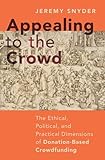Appealing to the crowd : the ethical, political, and practical dimensions of donation-based crowdfunding / Jeremy Snyder.
Publisher: New York, NY : Oxford University Press, [2024]Description: 261 pages ; 25 cmContent type:- text
- unmediated
- volume
- 9780197658130
| Item type | Current library | Status | Barcode | |
|---|---|---|---|---|
 Open Access Books - Publishers
Open Access Books - Publishers
|
National Law School | Available | OABP405 |
Includes bibliographical references (pages 225-249) and index.
"This book offers a close examination of the ethical, political, and practical dimensions of donation-based online crowdfunding for basic needs including medical treatment, housing, food, and education. Crowdfunding uses online platforms and social networks to raise money from friends, family, and complete strangers for a variety of projects and needs. This practice has grown massively worldwide in recent years in terms of the numbers of crowdfunding campaigns and donors, money raised, visibility, and cultural influence. While the money raised through crowdfunding has helped millions of recipients, there is also reason for concern around how it may undermine campaigners' privacy and dignity, mirror and exacerbate social inequities, mask and deepen social injustice, defraud donors, and spread misinformation and hate. I place this discussion of crowdfunding in the wider historical context of giving practices and show that crowdfunding can repeat and exacerbate ethical and political problems with traditional giving practices while creating other, new problems. While crowdfunding is often held up as a more democratic and less mediated giving practice than giving through philanthropies, crowdfunding platforms have a substantial role in mediating the relationship between donor and recipient, including determining what information is required in crowdfunding campaigns, influencing how viral crowdfunding campaigns are created, and deciding what kind of campaigns will be hosted. I conclude by presenting nine values that should guide donation-based crowdfunding. These values can help crowdfunding donors, campaigners, recipients, platforms, and policy makers preserve the good that can come from crowdfunding while addressing some of its many negative aspects"-- Provided by publisher.
There are no comments on this title.
